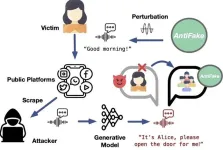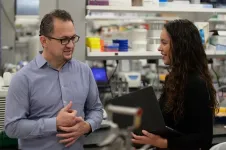(Press-News.org) Many gig workers experienced financial hardships during the COVID-19 pandemic, including food insecurity and trouble paying bills, according to a recent study published in Work and Occupations.
“In a nutshell, our study shows gig workers were harmed more by the COVID-19 pandemic than any other workers,” said Dr. Mathieu Despard, a co-author on the paper and faculty member in UNC Greensboro’s Department of Social Work.
Despard – who collaborated closely with first author Daniel Auguste at Florida Atlantic University and co-author Stephen Roll at Washington University in St. Louis – said the findings challenge the popular premise in the United States that gig work provides a sustainable alternative to traditional employment.
These results suggest that gig working can make it tricky for these individuals to make financial ends meet, said Despard.
“We have this very romantic narrative in this country that we’re the land of opportunity. If you want to start your own business, you can go for it. But when you peel that narrative back, you begin to realize that people who are doing gig work are often struggling for economic survival.”
The scientists found that about 33% of surveyed gig workers experienced food insecurity, 12% had skipped housing payments, and 33% had unpaid credit card findings between April 2020 and June 2021. Economic hardships were more pronounced for gig workers who had children, those with less savings, and those who worked multiple gig jobs.
Despard says that the unreliable nature of gig work can help explain why many experience more financial difficulty. For example, a food delivery driver may have one busy night followed by a day with little work. “This introduces unpredictable volatility, which can make it difficult to pay your bills and plan ahead,” he says.
Their findings are relevant to the approximately 15% of Americans who have gig worked at some point, according to the PEW Research Center.
A strength of the new study is the robust sample of gig workers, says Despard. The Social Policy Institute at Washington University in St. Louis’s Socioeconomic Impacts of COVID-19 Survey includes responses from 4,756 workers from a range of ages, income, genders, and race and ethnicities. Approximately 29% of respondents had engaged in gig work in the three months before they were surveyed.
“It’s a rigorous survey, and the respondents looked like the U.S. population,” Despard says. “The data is nationally representative.”
Despard says his research is, in general, driven by a desire to better understand the structural barriers that prevent Americans from reaching their financial goals.
“The bottom line is that it should not be this difficult for people to meet their basic needs because it has a toll on their mental health, a toll on their physical health, and it takes time away from their families,” Despard says.
Many gig workers experienced financial hardships during the COVID-19 pandemic, including food insecurity and trouble paying bills, according to a recent study published in Work and Occupations.
“In a nutshell, our study shows gig workers were harmed more by the COVID-19 pandemic than any other workers,” said Dr. Mathieu Despard, a co-author on the paper and faculty member in UNC Greensboro’s Department of Social Work.
Despard – who collaborated closely with first author Daniel Auguste at Florida Atlantic University and co-author Stephen Roll at Washington University in St. Louis – said the findings challenge the popular premise in the United States that gig work provides a sustainable alternative to traditional employment.
These results suggest that gig working can make it tricky for these individuals to make financial ends meet, said Despard.
“We have this very romantic narrative in this country that we’re the land of opportunity. If you want to start your own business, you can go for it. But when you peel that narrative back, you begin to realize that people who are doing gig work are often struggling for economic survival.”
The scientists found that about 33% of surveyed gig workers experienced food insecurity, 12% had skipped housing payments, and 33% had unpaid credit card findings between April 2020 and June 2021. Economic hardships were more pronounced for gig workers who had children, those with less savings, and those who worked multiple gig jobs.
Despard says that the unreliable nature of gig work can help explain why many experience more financial difficulty. For example, a food delivery driver may have one busy night followed by a day with little work. “This introduces unpredictable volatility, which can make it difficult to pay your bills and plan ahead,” he says.
Their findings are relevant to the approximately 15% of Americans who have gig worked at some point, according to the PEW Research Center.
A strength of the new study is the robust sample of gig workers, says Despard. The Social Policy Institute at Washington University in St. Louis’s Socioeconomic Impacts of COVID-19 Survey includes responses from 4,756 workers from a range of ages, income, genders, and race and ethnicities. Approximately 29% of respondents had engaged in gig work in the three months before they were surveyed.
“It’s a rigorous survey, and the respondents looked like the U.S. population,” Despard says. “The data is nationally representative.”
Despard says his research is, in general, driven by a desire to better understand the structural barriers that prevent Americans from reaching their financial goals.
“The bottom line is that it should not be this difficult for people to meet their basic needs because it has a toll on their mental health, a toll on their physical health, and it takes time away from their families,” Despard says.
END
Gig workers saw greater financial hardship during COVID-19 compared to other workers
2023-11-27
ELSE PRESS RELEASES FROM THIS DATE:
CU Anschutz scientists create patch that may successfully treat congenital heart defects
2023-11-27
AURORA, Colo. (Nov. 27, 2023) – Using laboratory engineered tissue, scientists at the University of Colorado Anschutz Medical Campus have created a full thickness, biodegradable patch that holds the promise of correcting congenital heart defects in infants, limiting invasive surgeries and outlasting current patches.
The findings were published this week in the journal Materials Today.
“The ultimate goal is to make lab-grown heart tissue from a patient’s own cells that can be used to restructure the heart to correct for heart defects,” said the ...
Defending your voice against deepfakes
2023-11-27
Recent advances in generative artificial intelligence have spurred developments in realistic speech synthesis. While this technology has the potential to improve lives through personalized voice assistants and accessibility-enhancing communication tools, it also has led to the emergence of deepfakes, in which synthesized speech can be misused to deceive humans and machines for nefarious purposes.
In response to this evolving threat, Ning Zhang, an assistant professor of computer science and engineering at the McKelvey School of Engineering at Washington University ...
Revolutionizing cancer treatment through programmable bacteria
2023-11-27
What if a single one-dollar dose could cure cancer?
A multi-university team of researchers, supported by federal funding, is developing a highly efficient bacterial therapeutic to target cancer more precisely to make treatment safer through a single $1 dose.
Traditionally, cancer therapies have been limited in their efficacy in treating patients. Some, like radiation and chemotherapy, cause harmful side effects, while others tend to result in low patient responsiveness, not to mention the cost it takes to receive treatment. Findings from the American Cancer Society Cancer Action Network recorded ...
One protein is key to the spread of lung cancer. Now, a new study has found a way to stop it
2023-11-27
A new study by Tulane University has uncovered a previously unknown molecular pathway that could be instrumental to halting lung cancer in its tracks.
Lung cancer is one of the most common cancers and the leading cause of cancer-related deaths in the world. The research, published in the journal Proceedings of the National Academy of Sciences, could lead to the development of a new anti-cancer drug and more personalized lung cancer treatment, said senior study author Dr. Hua Lu, the Reynolds and Ryan Families Chair in Translational Cancer at the Tulane University School of Medicine.
The study found ...
Study: Spike in premature births caused by COVID, halted by vaccines
2023-11-27
MADISON, Wis. — COVID-19 caused an alarming surge in premature births, but vaccines were key to returning the early birth rate to pre-pandemic levels, according to a new analysis of California birth records.
“The effect of maternal COVID infection from the onset of the pandemic into 2023 is large, increasing the risk of preterm births over that time by 1.2 percentage points,” says Jenna Nobles, a University of Wisconsin–Madison sociology professor. “To move the needle on preterm birth that much is akin to a disastrous ...
Why does puberty trigger us to stop growing?
2023-11-27
All animals start out as a single-celled organism and then start growing. At some point, of course, they need to stop getting bigger, but the process by which this happens is poorly understood.
New research from Alexander Shingleton at the University of Illinois Chicago and colleagues identifies a potential trigger that makes fruit flies stop growing, which has implications for understanding human development. The research is published in the Proceedings of the National Academy of Sciences.
In humans, the body’s signal to stop growing happens around puberty, though it takes several more years before growth actually ceases. It is important to better ...
Maternal vaccination against COVID-19 lowered risk of preterm births, Stanford study finds
2023-11-27
During the first two years of the pandemic, a COVID-19 infection during pregnancy increased the risk of preterm birth and NICU hospitalizations. However, by 2022, when COVID-19 vaccines were readily available in the United States, this effect disappeared – suggesting that vaccination against the coronavirus may have prevented thousands of preterm births, according to a new study led by Stanford sociologist Florencia Torche.
The study’s findings, published Nov. 27 in the journal Proceedings of the National ...
UCF receives $1.5million NSF grant to improve energy efficiency of wireless communications
2023-11-27
Wireless devices consume more than just the hours users spend scrolling through social media, streaming podcasts and TV shows, and playing games. The networks used to connect these devices also consume a large amount of energy – up to a few thousand terawatt-hours annually worldwide, which is enough to power 70,000,000 homes for one year.
UCF researcher Kenle Chen aims to enhance the energy efficiency of these systems with the support of a $1.5 million grant from the National Science Foundation’s Addressing Systems Challenges through Engineering ...
No IKAROS, no antibodies
2023-11-27
A cell nucleus is a busy place. Cellular proteins twist and pull DNA, folding the genome into intricate 3D structures that support functioning of its coding parts.
This choreography is essential for cell development, and the exact steps vary wildly between cell types. Establishing proper communication between genes and far-away control switches at the right time in the right cell is not a small feat. In fact, very few proteins have the right combination of features to organize the genome into the right structures.
In ...
New framework for using AI in health care considers medical knowledge, practices, procedures, values
2023-11-27
Health care organizations are looking to artificial intelligence (AI) tools to improve patient care, but their translation into clinical settings has been inconsistent, in part because evaluating AI in health care remains challenging. In a new article, researchers propose a framework for using AI that includes practical guidance for applying values and that incorporates not just the tool’s properties but the systems surrounding its use.
The article was written by researchers at Carnegie Mellon University, The Hospital for Sick Children, the Dalla Lana School of Public Health, Columbia University, and the University of Toronto. It is published in Patterns.
“Regulatory ...


